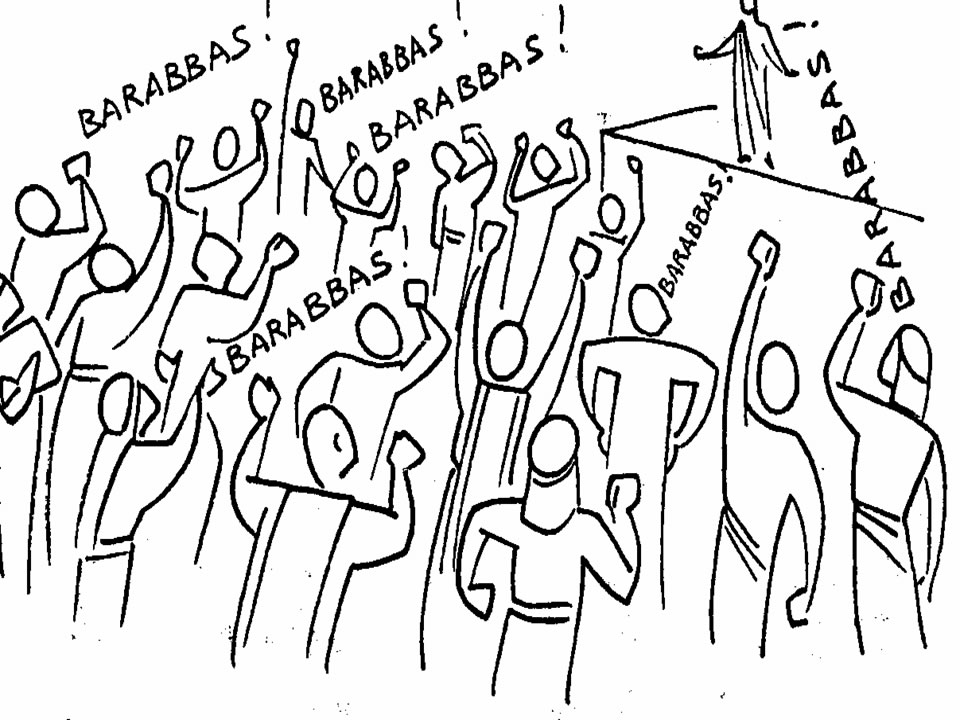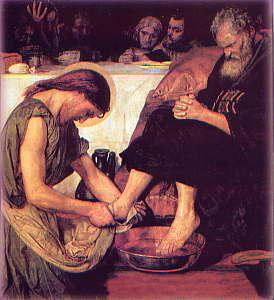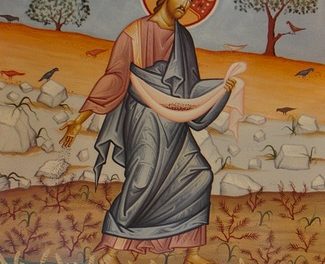Palm Sunday of the Lord’s Passion
March 29, 2015
Is 50:4-7; Ps 22:8-9,17-18,19-20,23-24; Phil 2:6-11; Mk 14:1–15:47 (or Mk 15:1-39)
As we prepare for Palm Sunday and the start of Holy Week this coming Sunday, we encounter Mark’s account of the Passion. I will be spending the morning of Palm Sunday in the Detention
Center of the local prison system, bringing in two first-time prison volunteers to meet the men and help me distribute the regulation-size palms (6 inches or less!) at our communion service. Palm Sunday is a bit of a preaching challenge – the story is so familiar and yet so rich with the essentials of our faith. This year, I am drawn to one well-known scene in particular. Mark tells us of a Passover tradition in which a prisoner, chosen by the people, is released by the Roman authorities. A man named Barabbas is currently in prison for involvement with a murderous rebellion. Mark’s account makes the guilt of Barabbas somewhat unclear – or at least indirect. Indeed, the fundamental point does not seem to be contrasting Barabbas’s guilt with the innocence of Jesus. The emphasis seems less about who is deserving of mercy and more about the choice being made by the people . . . and by us.
The most striking contrast between Jesus and Barabbas actually comes with their identities. The name Barabbas is derived from bar (son) and abba (father). The meaning of the name Barabbas given by commentators is therefore “Son of the Father.” It is hard to miss the irony here since we know Jesus to be the Son of God, i.e. the Son of the true Father. The choice then is, in a sense, between an earthly father and our heavenly father. And the question before us is whether we will wield our powers according to earthly customs of jealousy and dominance or to the heavenly witness of love and nonviolence.
Why is it that, when confronted with a choice between that which draws us toward God and that which draws us away from God, we opt for the latter?
Perhaps we fail to recognize the choice for God as such because we expect that choice to look very differently. We construct our divine expectations to fit our own agenda rather than being open to discovering God’s agenda.
For the crowds in Mark’s Gospel, how could Jesus be the Son of the true Father without military might? How could the Messiah be such a simple man, and one so seemingly weak and defenseless in the custody of Pilate? We convince ourselves we are not moving away from God because God is not one of the choices. We rationalize it as an offense to God when the image of human weakness somehow claims identity with divine omnipotence. And yet, it may be our own assumptions that are offended, not God’s.
Or perhaps we recognize the choice for God as such but find the implications of that choice too unsettling or burdensome. Some will tell themselves they have gone too far down other paths – for far too long – to be able to change directions now. Others will fear how such a choice will change the relationships they have come to rely upon. While others still will wonder how the crowds might taunt and harass them if they were to challenge the prevailing logic of the day. Whether inertia, security, reputation, or otherwise, what might seem like it ought to be the obvious choice in the abstract is often more costly and complex once we encounter it in reality. When Jesus and Barabbas stand right there before us, our fears and doubts can take over.
Another option still, which Mark seems to attribute to the chief priests who encourage the crowds, is not fear but envy and outright hostility. The question of which choice draws us toward and which choice draws away from God is not even the key question. The preservation of one’s own power is the overarching concern. Here we have succumbed to the allure of authority and privilege as the world offers it. We do not fundamentally trust that our best interests and our joy are found in God. We believe we already see the key to our fulfillment in the world around us; the challenge is simply to play this earthly game with cleverness and skill so that we can come out on top and stay there.
Moral theology invites us to think of our moral choosing and acting in conversation with the virtues. The virtues help us to see truthfully and to direct our desires and our will toward the good. And these very abilities are what are in question in the above scenarios for choosing between Jesus and Barabbas. Do we even see the choice for God accurately? And if we do, can we overcome the inhibitions of will (whether from fear or from love of power) to make that choice? The theological virtues of faith, hope, and love seem particularly helpful in response. It is with faith that we can recognize God on God’s terms, not our own. It is with hope that we can move forward in trust, despite the fears and doubts that make us hesitant. And it is with love that we can transform the deepest desires of our heart to be in union – not with worldly aspirations – but with God.
On Palm Sunday, many communities of faith will be acting out the Gospel and those in the pews will take on the voice of the crowds. When given the choice, we will say, “Barabbas, Barabbas!”
This ought not to come as a surprise given the daily struggle it is to be a faithful disciple. Perhaps we can wonder what it is that is driving that choice for us at this moment in our lives. And as we move toward the Easter celebration of new life, we can have some sense of whether we need to be enlivened by greater faith, greater hope, or greater love.
Ultimately, the moral of this story is not that we would have been better off to let Barabbas suffer and die. As noted at the start, this is not about correctly identifying who is deserving of mercy and who is deserving of punishment. Because, in choosing the Son of the true Father, we are choosing the one who has mercy in mind for all, including even those involved in murderous rebellions. The great beauty of this scene with Jesus and Barabbas is that, while the earthly authority offers to release only one prisoner, our God offers to release them all. As we will celebrate next Sunday, God’s promise of liberation and new life cannot be thwarted by even our most scandalous failures and vices. To choose the Son of God is to choose mercy for the innocent and the guilty alike.





